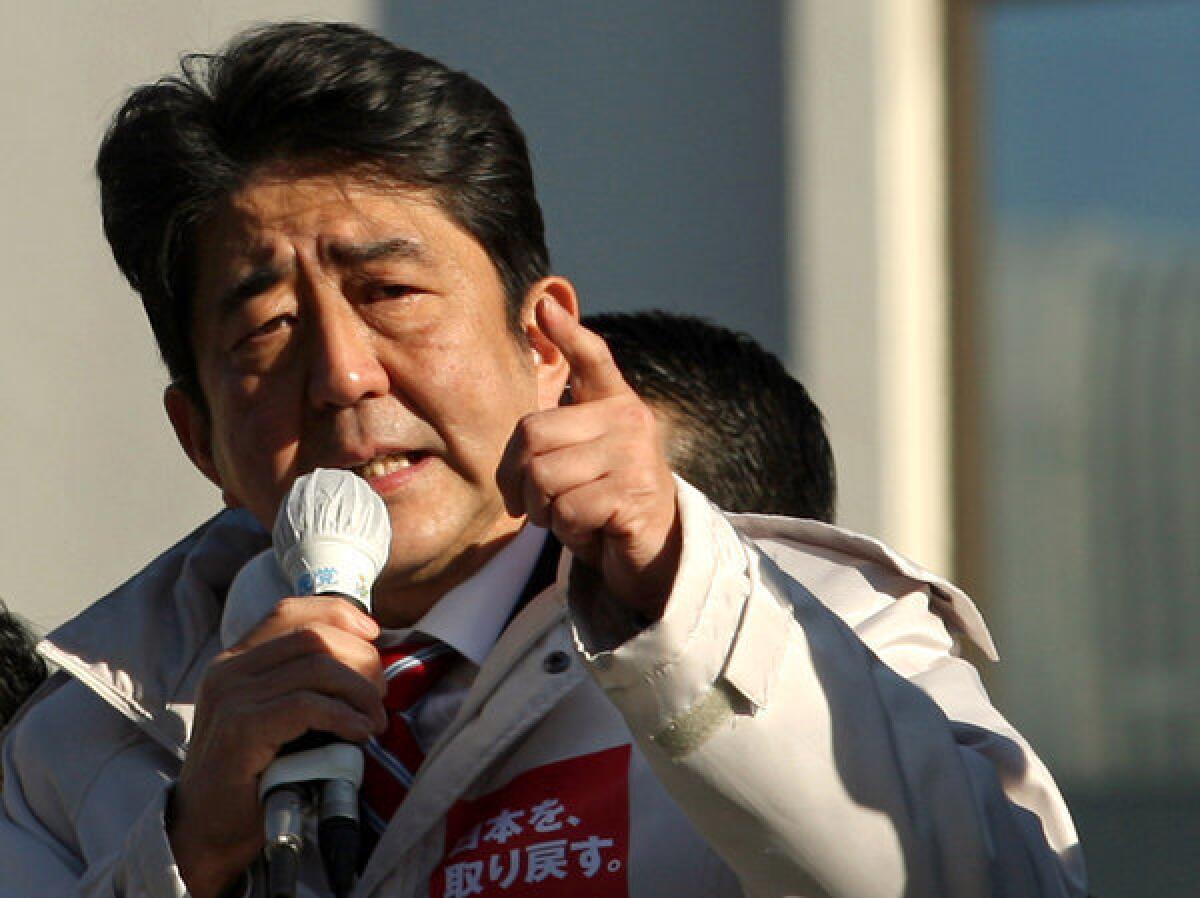Japan elections revive questions about peaceful constitution

Elections on Sunday are expected to return former Japanese leader Shinzo Abe to power, a hawk by the standards of restrained Japan. The nation’s apparent rightward swing has spurred concerns that a victorious Abe might attempt one of his most controversial quests: undoing Japan’s constitutional ban on waging war.
Predictions that Abe and his right-wing party will win are a result of the Japanese right profiting politically from disillusionment with the government of Prime Minister Yoshihiko Noda. The recent successful launch of a North Korean rocket and rising tensions over disputed islands also claimed by China have also played into the hands of conservatives.
But even with a victory, analysts say Abe and his allies will face an uphill battle if they try to write pacifism out of the constitution, a goal that the Japanese people have rejected before. Abe may upset China with more belligerent talk, but analysts say it is not likely that Japan would dramatically militarize.
“It’s a completely predictable thing for a country that has this giant, rising superpower in its backyard. ... But I get troubled when people talk about the ‘hawks’ being elected,” said Jennifer Lind, associate professor of government at Dartmouth College. “If anything, Japan is starting to act more like Canada.”
Japan is hardly pacifist today, if it ever was, analysts say. Though the ban on waging war was enshrined in the Japanese constitution in the wake of World War II, the country has long had a military. Japan has loosened past restrictions on warfare one by one, dispatching forces overseas on peacekeeping missions, helping fund the Gulf War and providing logistical support for American troops in Iraq.
Defending itself is widely seen as a legitimate use of Japanese force that doesn’t trample its constitution. Dispatching Japanese troops abroad on combat missions, however, remains a third rail.
“It’s about as unpopular in Japan as nuclear weapons,” said Paul Midford, a professor of political science at the Norwegian University of Science and Technology.
So Abe and his allies have hitched the idea of troop deployment to aiding allies such as the United States in “collective security operations,” an idea that might be more palatable to the Japanese public. Under existing agreements, the U.S. is obligated to defend Japan, but not vice versa.
If North Korea shot at the U.S., “we’d end up letting the missile pass. Such an event would spell the end of Japan-U.S. alliance ties,” Abe was recently quoted as saying in the Yomiuri Shimbun.
Slight changes, such as changing the name of the military from the “self defense force” to the “self defense army,” will likely come first, said Gavan Gray, a lecturer at Ritsumeikan University in Kyoto. Then conservative politicians might move on to the idea of helping to defend the U.S. because “people aren’t concerned about it.”
“It’s a matter of getting the public used to the idea,” Gray said.
Japanese politicians face a steep bar to changing the constitution: Two out of three lawmakers in both its upper and lower houses must support the idea before it goes up for a national vote. With a fractured and divided electorate, Japan may end up with a coalition government this fall, forcing Abe to turn to other parties -- including a Buddhist party opposed to war -- to push through changes.
Even if Abe and his Liberal Party of Japan gain control of the lower house Sunday, they do not hold a majority in the other body, which does not hold elections until next year. To change the constitution, politicians might need to ease the rules for changing it first.
A much easier solution is to simply reinterpret the constitution, the same step that Japanese leaders have taken before to smooth over obstacles to military moves. Abe and his Cabinet could merely send out a statement; the Japanese courts could then challenge it, but they rarely do, Midford said.
Observers say an Abe government is unlikely to take radical steps with the military. Abe is expected to bolster the Coast Guard presence around the contested islands and to continue building up Japan’s submarine fleet, but most believe it rhetoric would be ratcheted up, rather than weaponry.
“You’re not going to start a military conflict with the Chinese air force over the Senkaku” islands, said Ayako Doi, an associate fellow with the Asia Society. “Anybody could see that would be a disaster.”
Abe will be expected to focus squarely on the economy if he gains power, said Masahiro Matsumura, professor of international politics at St. Andrew’s University in Osaka. Japanese analysts expect China and North Korea also to focus inward in the next year, potentially cooling tensions between the countries, Matsumura added.
But tougher talk from Abe could still have real effects, Lind warned, especially when it comes to the sensitive history between Japan and its neighbors. Abe has pledged to visit a deeply controversial wartime shrine that honors convicted war criminals along with ordinary soldiers. And he wants to backtrack on an official apology for the sexual enslavement of Korean “comfort women” during war.
“When the Chinese are torching Japanese businesses,” Lind said, referring to riots earlier this year over the disputed islands, “we don’t need another crisis between Japan and China.”
ALSO:
North Korea leader’s stock rises with rocket launch
Hamas celebrates its 25th anniversary in West Bank
Human rights court rules in former CIA detainee’s favor
More to Read
Start your day right
Sign up for Essential California for news, features and recommendations from the L.A. Times and beyond in your inbox six days a week.
You may occasionally receive promotional content from the Los Angeles Times.






